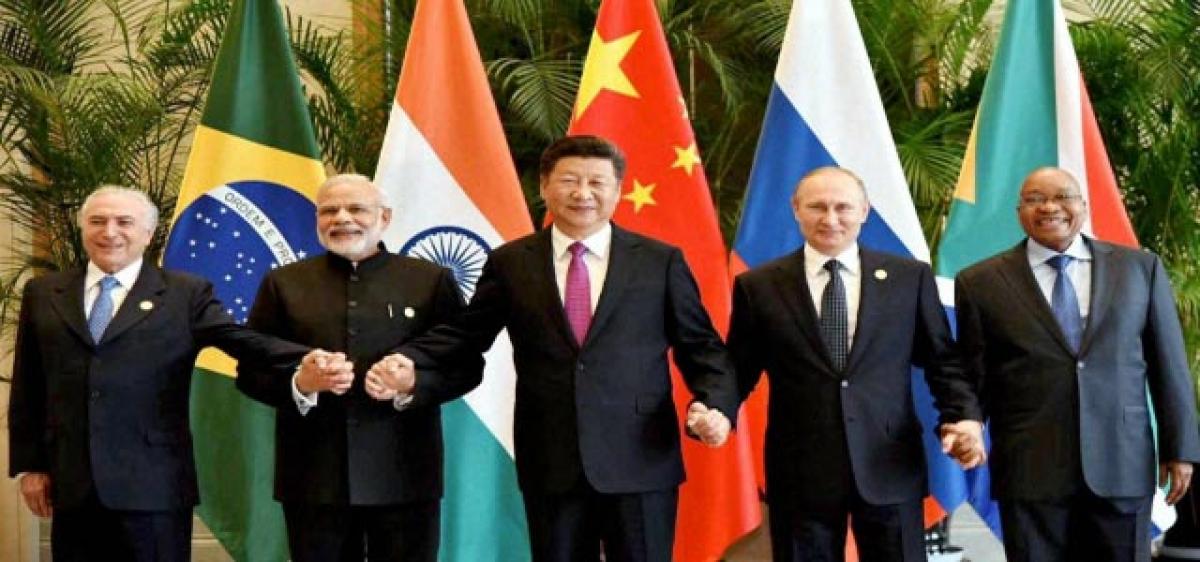Live
- GMR Airports Unveils AI-Powered Digital Twin Platform to Transform Airport Operations
- India poised to become leading maritime player: PM Modi
- Top Causes of Kidney Stones and How to Recognize Silent Symptoms
- India’s renewable energy capacity logs 14.2 pc growth at 213.7 GW
- Winter Session of Odisha Assembly adjourned sine die
- Biden calls Trump's tariff approach 'major mistake'
- After Drama Over Eknath Shinde’s Chief Minister Race, Maharashtra Cabinet Formation Faces New Tensions
- Egyptian FM, Blinken discuss recent developments in Syria
- Iran's supreme leader says Syria's developments result of US-Israeli 'plot'
- Elon Musk to Purchase $100 Million Luxury Mansion Next to Donald Trump's Mar-a-Lago, Report Reveals
Just In

The Goa Declaration issued at the conclusion of the BRICS summit is justifiably hailed as a diplomatic victory for India, in its attempts to gather international support for its fight against the philosophy and practice of terrorism.
The Goa Declaration issued at the conclusion of the BRICS summit is justifiably hailed as a diplomatic victory for India, in its attempts to gather international support for its fight against the philosophy and practice of terrorism. It called for a Comprehensive Convention on International Terrorism (CCIT) in the UN General Assembly.
The Declaration contains nine points relating to combating terrorism collectively out of the total of 109 points. It strongly condemned terrorism in all its forms and manifestations and stressed that there can be no justification whatsoever, for acts of terrorism, whether based on ideological, religious, political, racial, ethnic, or any other grounds.
India has maintained its balanced posture knowing it fully well that however important and urgent may be the fight against terrorism, BRICS platform cannot be reduced to deal exclusively with this problem. BRICS presents a united front of some of the fastest growing economies more to defend their interests in globalisation despite some bilateral problems within. Western countries including the US watch with keen interest the proceedings and outcome of BRICS meetings.
In keeping with the broad objectives of BRICS, the Goa Summit also dealt with several issues besides terrorism. The bloc agreed to institute Agricultural Research Platform, Railway Research Network, a Sports Council and youth-centred forum on which there were no two opinions. The meet reaffirmed the need for comprehensive reform of the UN including its Security Council with a view to making it more representative, effective, and efficient and to increasing representation of developing countries so that it can adequately respond to global challenges.
Goa Summit did not remain restricted to highlighting the issue of terrorism as depicted in many reports, discussions, and comments, which tend to overlook or treat as secondary some 100 other points in the Declaration. Goa also hosted a regional set up, BIMSTEC – Bay of Bengal Initiative for Multi-Sectoral Technical and Economic Cooperation – (Bangladesh, Bhutan, India, Myanmar Nepal, and Sri Lanka) along with BRICS providing opportunities for the two groupings to take some common stand particularly against terror sponsors in the region.
Modi’s description of Pakistan in the context of terrorism may have drawn global attention, but was not accepted unanimously by all the members of BRICS to become part of the Declaration. Moreover, China has expressed its dissent to depicting any nation or religion as terrorist or the mother of terrorism. Beijing’s argument that Pakistan has made many sacrifices in fighting terrorism is indicative of the division within BRICS in fighting terrorism despite unanimity in the goal of fighting terrorism.
Bilateral relations within BRICS countries and of a BRIC member with a non-member State have not proved so far a source of conflict for the future of the organisation. India-China issues are a thorn that should be removed in their own self-interest. Some crucial China-Pakistan ties in the vicinity of Indo-Pak differences, India-US strategic partnership and interests in South China Sea, Russia’s defence agreements with Pakistan and joint military exercises, and India’s bid for NSG membership seeking a lead over Brazil and South Africa are some sources that may look incongruous with BRICS unity.
However, nations have matured enough in international relations and capable of segregating issues and cultivating healthy relations with different partners for different purposes at the same time. There is no danger to BRICS declarations from other bilateral contacts provided the sanctity of the Declaration is honoured. Building BRICS against terrorism is not an overnight job. It has to be done brick by brick. Goa Summit has covered a long way.
By Dr S Saraswathi

© 2024 Hyderabad Media House Limited/The Hans India. All rights reserved. Powered by hocalwire.com







